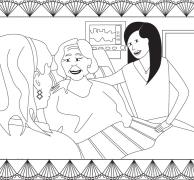|
Monday, February 20, 2023
 Recently, our former president, Jimmy Carter, decided to stop his own life-sustaining treatments to receive at-home hospice care so he can spend his final days surrounded by family and friends. When I was serving as my father’s healthcare surrogate, I had to make the decision to enroll him in hospice services at the end of his life.Whether or not to enroll a family member in hospice care is an issue that many families face and it can be very confusing. Here is an article outlining what hospice is, how to find one, and also how to spot a hospice company that might be practicing some Medicare fraud: When faced with a terminal illness or condition, more people than ever are choosing hospice care over starting or continuing expensive medical treatments. Hospice care is for patients who choose not to undergo specific treatments or when they are no longer effective.
Read more . . .
Monday, February 20, 2023
 It’s February already, and today is another gloomy, drizzly day. As I’m writing this, it is getting close to February 28, the day when most people give up on their New Year’s resolutions. How are you doing with those resolutions? I’m trying to stick with my resolution to go outside every day for 23 minutes, but days like today make it much more difficult to get out the door.
One resolution I would urge you to keep, is to get an Advance Directive for Healthcare, or help someone you are caring for complete one. Clients often get stuck because they don’t really know what care they might want at the end of life, or don’t know who should make the decisions about end-of-life care.
Read more . . .
Wednesday, December 7, 2022
 We are now living in “The Sandwich Generation” era. The Sandwich Generation refers to those caregivers, generally between the ages of 45 and 59, who are caring for aging parents while also caring for young children or dependent young adult children. One of the issues facing many of those caregivers is how to pay for the aging parent’s long-term care needs. Long-term care refers to ongoing assistance to meet some of the basic activities of daily living, such as bathing, eating, dressing, using the toilet, transferring from bed or chair, caring for incontinence or eating. The type and cost of long-term care depends on the services necessary for the health and safety of the person.
Read more . . .
Tuesday, October 4, 2022
 I just got back from a trip to the beach where there were back-to-back weddings near the ocean. So many new brides and grooms! Are you planning to get married or divorced in the near future? How will that affect your estate plan?
An estate plan has lots of pieces and moving parts, but let’s start with how marriage and divorce affect the basic legal documents you should have in your estate plan.
WHAT HAPPENS TO MY OLD WILL?
If you marry after signing a will and you have not specifically stated in the document that you are executing the will in anticipation of a future marriage, that will signed previous to marriage will not be valid. If you then die without executing a new will, you will die intestate and the rules of the state of Georgia will control distribution of your assets. That means that if you have a wife and children, your new spouse will share the assets in your probate estate with your children. Read more . . .
Tuesday, October 4, 2022
 For many of you, the bulk of the estate ("stuff") that you will be passing on to your loved ones is controlled not by your will, a trust or the probate court, but by the beneficiaries you designated on forms filed with financial institutions. 401(k)'s, IRAs, and Life Insurance policies will be distributed at your death based on whom you have chosen as a beneficiary. Based on my conversations with clients, I'm betting that many of you have not checked those designations in a very long time - if ever. What can happen if you name the wrong beneficiary or No beneficiary?First, let's talk about what may happen if you name no beneficiary. If you do not name a beneficiary for a life insurance policy, after your death an estate will have to be opened to receive the money from that policy. Read more . . .
Monday, October 3, 2022
 If a person dies without a will, they are said to have died “intestate”. When that happens, the person’s assets will be passed to the heirs based on the rules that Georgia’s intestate succession rules. The probate process for a person who is intestate is called an administration and the person named to take care of your estate after your death is called an administrator. The administrator will file a petition in the probate court, and once appointed and sworn in by the judge, the administrator will first pay the debts of the estate and then make distributions to the living heirs of the deceased person. - If you have a spouse but no children, the spouse will get the entire estate;
- If you have children, but no spouse, your children will divide the estate equally.
Read more . . .
Wednesday, September 14, 2022
 Mary, an independent, strong-willed woman all of her life, realized that she might need help managing her finances. She came to me with concerns that her memory might be slipping a little, and she was afraid that she might forget to pay her bills. After assuring her that she was fine, I encouraged her to consider placing her assets in a trust so that she could write her own rules for management of those assets. Mary was skeptical. “Trusts are way too complicated for me! I don’t even know what a trust is. Read more . . .
Tuesday, August 30, 2022
 Mary has several businesses, a real estate partnership with one other person, another business organized as a Limited Liability Company of which she owns 51%, and a third business organized as a corporation which Mary owns 50% of the shares and her brother owns the other 50%. Mary has three children, two are well into adulthood, but her youngest is 17 and will be starting college next year and plans to study medicine after she completes her undergraduate degree. Her oldest child, Lindsey, has been working in Mary’s LLC for several years, and has expressed interest in becoming an owner at some point in the future. The other adult child, Hunter, has no interest in working in any of the businesses.
As a single mother, Mary is concerned about what will happen to her businesses because they are her main source of income and her largest assets. Read more . . .
Tuesday, July 19, 2022
 Parents want their children to be taken care of after they die. But children with disabilities have increased financial and care needs, so ensuring their long-term welfare can be tricky. Proper planning by parents is necessary to benefit the child with a disability, including an adult child, as well as assist any siblings who may be left with the caretaking responsibility. Parents want their children to be taken care of after they die. But children with disabilities have increased financial and care needs, so ensuring their long-term welfare can be tricky. Proper planning by parents is necessary to benefit the child with a disability, including an adult child, as well as assist any siblings who may be left with the caretaking responsibility.
Special Needs Trusts
The best and most comprehensive option to protect a loved one is to set up a special needs trust (also called a supplemental needs trust). These trusts allow beneficiaries to receive inheritances, gifts, lawsuit settlements, or other funds and yet not lose their eligibility for certain government programs, such as Medicaid and Supplemental Security Income (SSI).Read more . . .
Wednesday, June 22, 2022
7243.jpg) ABLE (Achieving a Better Life Experience) accounts offer people with disabilities a great, tax-free way to accumulate money without jeopardizing their qualifications for Supplemental Security Income (SSI) and other means-tested programs. Withdrawals are tax-free as long as the money is used for “qualified disability expenses.” The arguments for starting and maintaining such funds are overwhelming, not least of which is the wide variety of things on which the money can be spent. To build 529A ABLE accounts, beneficiaries (and other contributors) can put up to $16,000 total into these funds each year. Read more . . .
Wednesday, June 8, 2022
 Last month, we discussed the most important documents you need to prepare yourself for a potential disability that impairs your ability to make financial or healthcare decisions for yourself. This month we will discuss what to do if you are responsible for making healthcare or financial decisions for someone with a disability. A few years ago, my father started to show signs that he was suffering from dementia. He was always a very intelligent man and had good social skills, so the dementia was most likely hidden for a number of years. At some point, he began paying his bills twice or not paying them at all, and he and his girlfriend got lost while driving to familiar places. Read more . . .
← Newer12 3 4 5 6 7 8 9 Older →
The Elrod-Hill Law Firm,LLC assists clients with Estate Planning, Veterans Benefits, Medicaid, Elder Care Law, Probate, Special Needs Planning and Pet Trusts in the North Atlanta area including the counties of Dekalb, Gwinnett and Fulton.
|

|
|
|